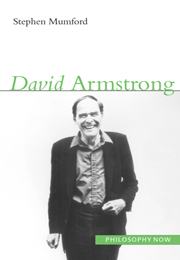6 - States of affairs
Summary
We have seen how Armstrong has developed naturalistic theories of universals, laws and causation, modality and dispositions. What has emerged is a consistent and, to a large extent, systematic view of the world. This may not have been Armstrong's original intention, as he does not present himself as a system-builder, but it seems that he did come to see his work more and more as an integrated whole. Towards the end of his career, he decided to present his philosophy in such a way in A World of States of Affairs. This chapter will present the most important ideas of that work and show how the theories discussed in previous chapters all come together.
We can start with the question of what, fundamentally, the world is made of. The philosophical enterprise is to interpret this question in a general and abstract way. What are the general categories of things that exist? A simple answer would be that the world is a sum of particular objects, such as tables and chairs, planets and electrons, dogs and cats. But if this were all there was in the world, something would seem to be missing. Armstrong sees this, and agrees with Wittgenstein, near the start of the Tractatus (1921: 1.1), that the world is not just a sum total of things. Another option would be to say that the world is a totality of properties.
- Type
- Chapter
- Information
- David Armstrong , pp. 95 - 110Publisher: Acumen PublishingPrint publication year: 2007



